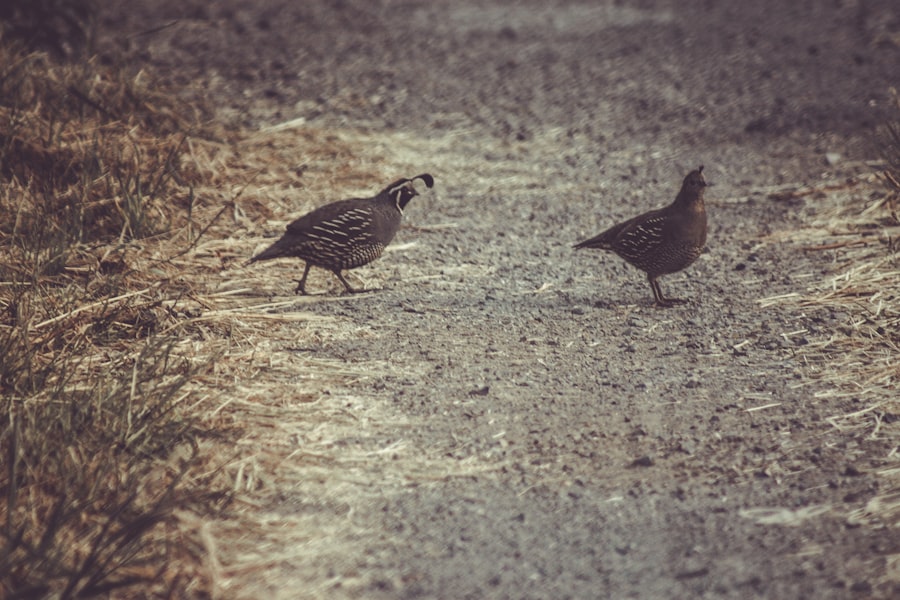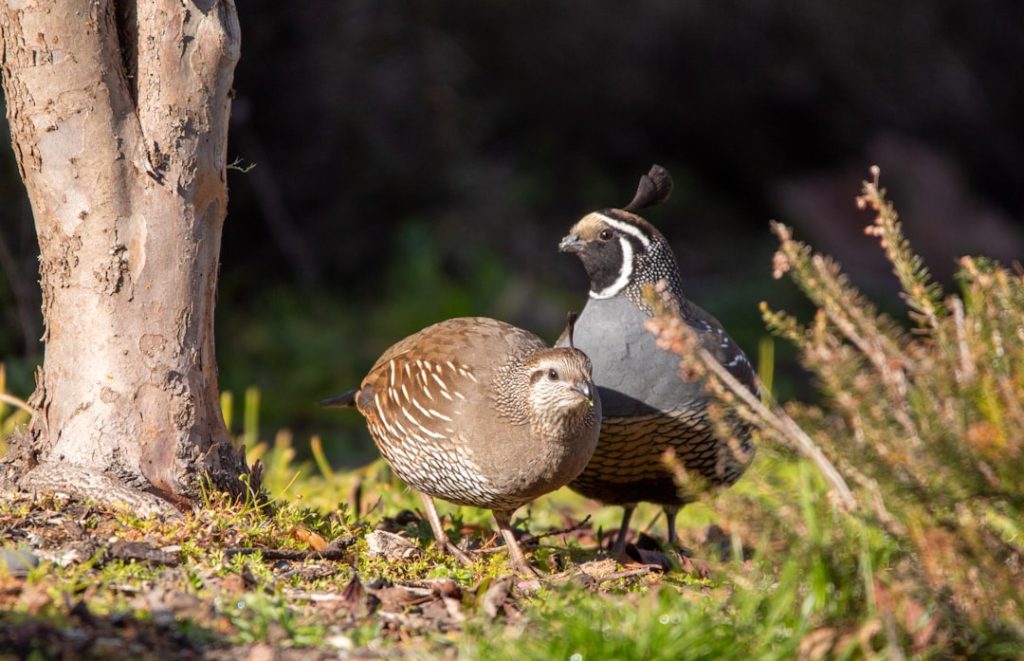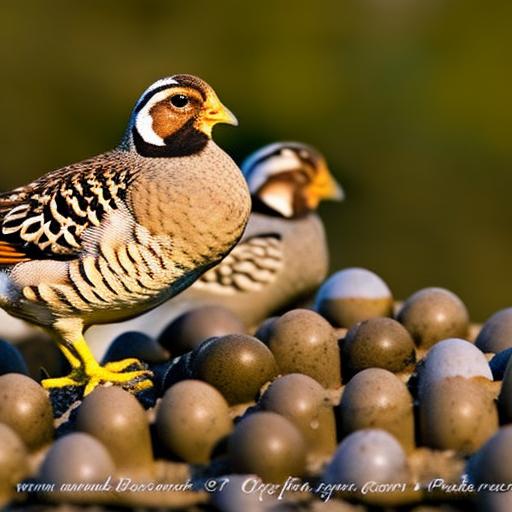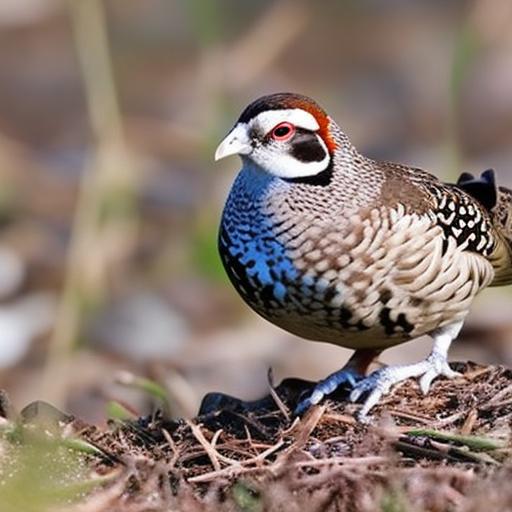Quail are small, ground-dwelling birds that are popular for their delicious eggs and meat. While there are many common quail breeds that are raised for commercial purposes, there is also a growing interest in exotic quail breeds for breeding and exhibition. Exotic quail breeds are known for their unique and striking physical characteristics, making them a popular choice for hobbyists and enthusiasts. These breeds come in a variety of colors and patterns, and they often have distinct features that set them apart from their more common counterparts. In this article, we will explore the characteristics, popular breeds, care, breeding, and challenges of raising exotic quail breeds.
Table of Contents
- 1 Characteristics and Physical Appearance of Exotic Quail Breeds
- 2 Popular Exotic Quail Breeds for Breeding and Exhibition
- 3 Caring for Exotic Quail Breeds: Housing, Diet, and Health
- 4 Breeding and Rearing Exotic Quail Breeds
- 5 Challenges and Considerations in Raising Exotic Quail Breeds
- 6 The Appeal of Exotic Quail Breeds
- 7 FAQs
Key Takeaways
- Exotic quail breeds offer a unique and diverse range of options for breeders and enthusiasts.
- Exotic quail breeds come in a variety of colors, patterns, and sizes, making them visually appealing for breeding and exhibition.
- Popular exotic quail breeds for breeding and exhibition include the Chinese Painted Quail, Japanese Quail, and Bobwhite Quail.
- Proper housing, a balanced diet, and regular health checks are essential for caring for exotic quail breeds.
- Breeding and rearing exotic quail breeds require attention to breeding pairs, egg incubation, and chick rearing for successful reproduction.
Characteristics and Physical Appearance of Exotic Quail Breeds
Exotic quail breeds are known for their diverse and striking physical appearances. They come in a wide range of colors, including but not limited to white, brown, black, silver, and gold. Some breeds also have unique patterns such as speckles, stripes, or spots, which add to their visual appeal. In addition to their coloration, exotic quail breeds often have distinct physical features such as crests, tufts, or feathered feet, which set them apart from more common quail varieties. These unique characteristics make them highly sought after for exhibition and breeding purposes.
In terms of size, exotic quail breeds are generally similar to common quail breeds, with most varieties weighing between 4-7 ounces and measuring around 6-10 inches in length. Despite their small size, exotic quail breeds are known for their active and alert nature, making them a joy to watch and care for. Their small size also makes them well-suited for backyard or small-scale farming operations, as they require less space and resources compared to larger poultry species. Overall, the diverse and striking physical appearances of exotic quail breeds make them a popular choice for hobbyists and enthusiasts looking to add a unique and visually appealing addition to their flock.
Popular Exotic Quail Breeds for Breeding and Exhibition
There are several popular exotic quail breeds that are highly sought after for breeding and exhibition purposes. One of the most well-known exotic quail breeds is the Tibetan quail, which is prized for its striking appearance and distinctive crest on its head. The Tibetan quail comes in a variety of colors, including silver, brown, and white, and is known for its friendly and docile temperament, making it a popular choice for hobbyists and breeders alike.
Another popular exotic quail breed is the Manchurian Golden quail, which is known for its beautiful golden coloration and striking black facial markings. This breed is highly prized for its unique appearance and is often exhibited at poultry shows and exhibitions. Additionally, the British Range quail is another popular exotic breed known for its striking coloration and distinctive feather patterns. These are just a few examples of the many exotic quail breeds that are popular among enthusiasts and breeders for their unique and visually appealing characteristics.
Caring for Exotic Quail Breeds: Housing, Diet, and Health
Caring for exotic quail breeds requires attention to their specific housing, diet, and health needs. When it comes to housing, exotic quail breeds require a secure and predator-proof enclosure that provides ample space for them to move around and exhibit their natural behaviors. The enclosure should also include areas for dust bathing, perching, and nesting to ensure the birds’ physical and mental well-being. Additionally, it’s important to provide adequate ventilation and protection from the elements to keep the birds comfortable and healthy.
In terms of diet, exotic quail breeds require a balanced diet that includes high-quality commercial quail feed supplemented with fresh fruits, vegetables, and protein sources such as mealworms or crickets. It’s important to provide access to clean water at all times to ensure proper hydration. Additionally, providing access to grit or small stones is essential for aiding in the birds’ digestion.
Maintaining the health of exotic quail breeds requires regular monitoring for signs of illness or injury, as well as providing routine veterinary care as needed. It’s important to keep the birds’ living environment clean and free from parasites or disease-carrying pests. By providing proper housing, a balanced diet, and regular health care, enthusiasts can ensure the well-being of their exotic quail breeds.
Breeding and Rearing Exotic Quail Breeds
Breeding exotic quail breeds can be a rewarding experience for enthusiasts looking to expand their flock or produce birds for exhibition or sale. When breeding exotic quail breeds, it’s important to select healthy breeding stock with desirable physical characteristics to produce offspring that meet breed standards. Breeding pairs should be housed in a separate enclosure to allow for privacy and minimize stress during the breeding process.
Once eggs are laid, they should be collected daily and placed in an incubator set to the appropriate temperature and humidity levels for quail eggs. After an incubation period of approximately 17-18 days, the eggs will hatch, and the chicks will need to be carefully monitored and provided with a warm and safe environment to grow and develop.
Rearing young exotic quail breeds requires attention to their specific dietary and environmental needs to ensure healthy growth and development. Chicks should be provided with a high-quality starter feed formulated specifically for game birds to support their rapid growth and nutritional requirements. Additionally, providing access to clean water, warmth, and protection from predators is essential for rearing healthy young quail. By following best practices for breeding and rearing exotic quail breeds, enthusiasts can contribute to the preservation and promotion of these unique and visually appealing bird varieties.
Challenges and Considerations in Raising Exotic Quail Breeds

While raising exotic quail breeds can be a rewarding experience, there are several challenges and considerations that enthusiasts should be aware of. One challenge is sourcing high-quality breeding stock with desirable physical characteristics, as some exotic quail breeds may be less common or more difficult to find compared to their more common counterparts. Additionally, maintaining genetic diversity within breeding populations is important for preserving the health and vitality of exotic quail breeds over time.
Another consideration is the potential for increased susceptibility to certain health issues or genetic abnormalities in some exotic quail breeds due to their unique physical characteristics. Enthusiasts should be prepared to provide appropriate care and seek veterinary assistance as needed to address any health concerns that may arise.
Furthermore, enthusiasts should be mindful of local regulations and zoning restrictions that may impact their ability to raise exotic quail breeds on their property. It’s important to research and comply with any applicable laws or regulations related to keeping poultry to avoid potential legal issues.
Overall, by being aware of these challenges and considerations, enthusiasts can take proactive steps to ensure the successful raising of exotic quail breeds while promoting their health and well-being.
The Appeal of Exotic Quail Breeds
In conclusion, exotic quail breeds offer a unique and visually appealing addition to any flock for hobbyists and enthusiasts. Their diverse coloration, striking physical characteristics, and active nature make them a popular choice for breeding and exhibition purposes. By providing proper housing, diet, health care, breeding, rearing practices, enthusiasts can contribute to the preservation and promotion of these unique bird varieties while enjoying the rewards of raising these captivating birds. While there are challenges and considerations in raising exotic quail breeds, the appeal of these birds lies in their beauty, diversity, and the joy they bring to those who appreciate their unique qualities.
If you’re fascinated by exotic quail breeds, you’ll love learning about the best kind of coop for chickens. A well-designed coop is essential for the health and happiness of your feathered friends. Check out this informative article on Poultry Wizard to discover the ideal coop setup for your chickens and how it can benefit their overall well-being.
FAQs
What are exotic quail breeds?
Exotic quail breeds are varieties of quail that are not commonly found in the typical domestic quail population. These breeds often have unique physical characteristics and may be more rare or difficult to find.
What are some examples of exotic quail breeds?
Examples of exotic quail breeds include the Tibetan quail, the Japanese quail, the King quail, and the Bobwhite quail. These breeds may have distinct color patterns, markings, or other physical traits that set them apart from more common quail varieties.
Where can I find exotic quail breeds?
Exotic quail breeds can often be found through specialty breeders, poultry shows, and online forums or marketplaces dedicated to quail enthusiasts. Some breeders may specialize in specific exotic quail breeds and offer them for sale to interested buyers.
What are the care requirements for exotic quail breeds?
Care requirements for exotic quail breeds are generally similar to those of more common quail varieties. They need a suitable enclosure, proper nutrition, access to clean water, and protection from predators. However, specific breed characteristics and behaviors should be taken into consideration when caring for exotic quail breeds.
Are exotic quail breeds suitable for beginners?
Exotic quail breeds may require more specialized care and attention compared to common quail varieties, so they may not be the best choice for beginners. It’s important for prospective quail owners to research the specific needs of exotic breeds and ensure they are prepared to meet those requirements before acquiring them.
Meet Walter, the feathered-friend fanatic of Florida! Nestled in the sunshine state, Walter struts through life with his feathered companions, clucking his way to happiness. With a coop that’s fancier than a five-star hotel, he’s the Don Juan of the chicken world. When he’s not teaching his hens to do the cha-cha, you’ll find him in a heated debate with his prized rooster, Sir Clucks-a-Lot. Walter’s poultry passion is no yolk; he’s the sunny-side-up guy you never knew you needed in your flock of friends!







